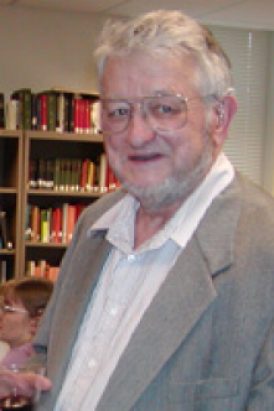
Ludwig Koenen, Herbert C. Youtie Distinguished University Professor Emeritus of Papyrology at the University of Michigan died on May 9, 2023. He was a scholar of exceptional importance in papyrology and Greek literature and religion, a tireless and generous editor, advisor and teacher, and a model of service to his department and his discipline.
Born in Cologne on April 5, 1931, Ludwig, whose father was a carpenter and a Social Democrat, spent his childhood under Nazism and was imbued with resistance to tyranny and bigotry. He studied classical philology at the University of Cologne and became a papyrologist as a student of Reinhold Merkelbach. After earning his PhD from the University of Cologne in 1957, he became archivist of the Cologne papyrus collection from 1957, while teaching papyrology, epigraphy and paleography. In 1967 he and Merkelbach founded the Zeitschrift für Papyrologie und Epigraphik, the most important journal in both papyrology and ancient Mediterranean epigraphy. After his habilitation in 1969 he became professor at the University of Cologne in 1971. In 1975 Ludwig joined the University of Michigan as Associate Professor and taught there until his retirement in 2000.
Ludwig undertook many initiatives for the University of Michigan papyrus collection, including working with the Library’s conservation department to begin the conservation of the collection, which at that time was still housed largely in the original packaging in which papyri had arrived from Egypt in the 1920s. He regularly taught seminars in papyrology, and the first publication of many Michigan students was the edition of a Michigan papyrus. In both teaching and research, he went beyond the technical side of papyrology, seeking to place both documents and literary texts in their historical and cultural contexts.
He also taught an undergraduate class on Greek religion and some undergraduate Greek, and graduate courses on Greek prose composition and on Greek poetry, archaic through Hellenistic. He directed dissertations and served on committees in all these areas. His meticulous attention to students’ work could be intimidating, although his warning “I have a problem with your dissertation” often turned out to refer to an error in the second paragraph on page 145. Students were immensely grateful for his helpfulness and kindness.
Most of the 129 publications listed under his name in L’ Année philologique (from 1953 to 2013) are papyrological, and he is perhaps most remembered for his work on the Cologne Mani-Codex—which transformed our understanding of this important ancient religion— the Egyptian apocalyptic “Oracle of the Potter,” and the Byzantine documents from Petra that constituted his last major project. The range of his bibliography, however, is astonishing, including important contributions about the new Archilochus, Menander, Egyptian elements in Tibullus, and many Biblical papyri. At the same time, he devoted endless hours to rigorous and thoughtful editing at ZPE and the monograph series Beiträge zum Altertumskunde.
He received many honors: at Michigan, Herbert C. Youtie Collegiate Professor of Papyrology and then Distinguished University Professor; Henry Russel Lecturer in 1996. He was a member of the American Academy of Arts and Letters and the American Philosophical Society, a Corresponding Fellow of the British Academy and a Corresponding Member of the German Archaeological Institute and the Nordrhein-Westfälische Academy of Arts and Sciences. He served as President of the American Philological Association in 1993. “Served” is the significant word. As chair of the Department of Classical Studies from 1985–1994, he was always available to help colleagues and students, promoting a departmental culture of inclusion and mutual respect.
The hospitality of Ludwig and Margret Koenen was unforgettable. His mistakes in English, passed down in an oral tradition, are recounted with laughter and profound affection. For those who knew him, imagining the world without him is what he might have called “a hillup struggle.”
